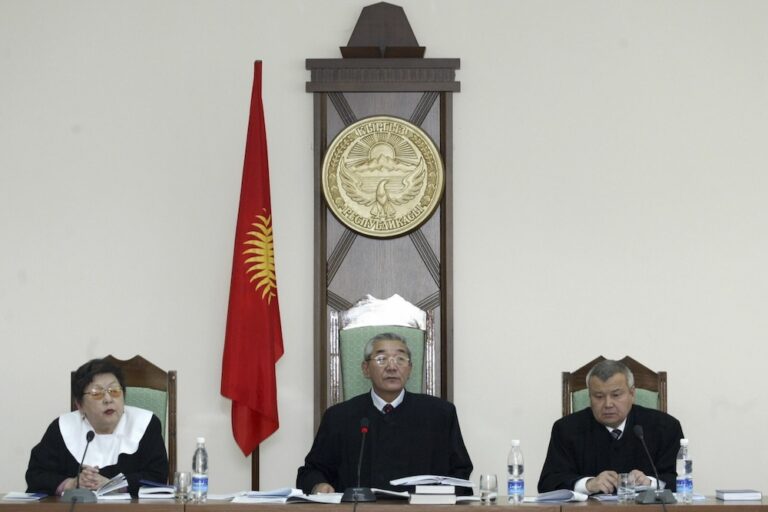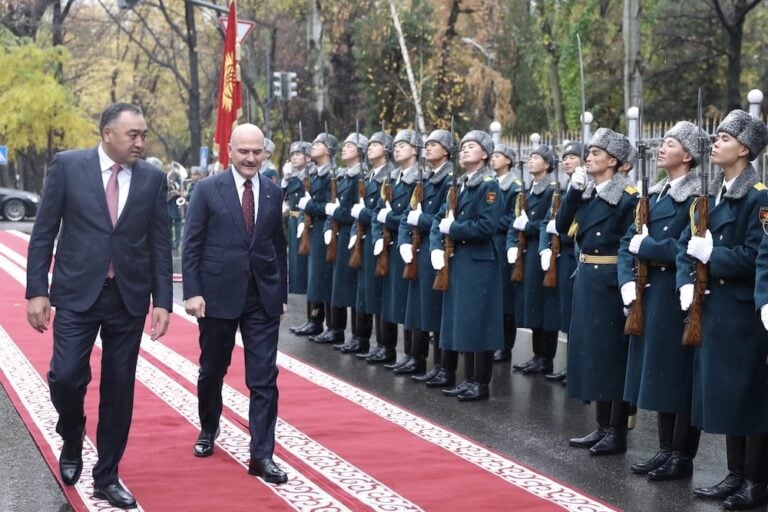Gennady Pavlyuk, who wrote under the pseudonym Ibrahim Rustambek, died after he was bound in tape and pushed out of the window of an apartment building in Almaty.
(Adil Soz/IFEX) – The killers of Kyrgyz journalist Gennady Pavlyuk have been sentenced, but the mastermind of his killing remains unknown.
On 11 October, a specialized inter-district criminal court in Almaty found Aldayar Ismankulov, Shalkar Orazalin and Almas Igilikov guilty in Pavlyuk’s murder. Pavlyuk, 51, died in December 2009 from injuries sustained after falling from the window of an apartment building in Almaty.
Ismankulov, a former security service officer, was sentenced to 17 years in jail plus a fine of KZT 756,000 (approx. US$5,100) in total. He was found guilty of organizing a premeditated murder, of kidnapping under a preliminary conspiracy, and of forgery. Ismankulov had previously been under suspicion of committing other high-profile crimes and of having links to organized crime. He also enjoyed the patronage of former President of Kyrgyzstan Kurmanbek Bakiyev, Fergananews.com reports. Ismankulov was appointed as the head of the department for combating organized crime, and later he became a head of the technical department which was involved in phone tapping, spying on e-mails, and on the surveillance of citizens.
Shalkar Orazalin and Almas Igilikov were found guilty of kidnapping under a preliminary conspiracy only. Orazalin was sentenced to 11 years in prison and was fined KZT 382,000 (approx. US$2600); Igilikov was sentenced to 10 years in prison and fined KZT 312,000 (approx. US$2100), and the court ordered that his property be seized.
The three men have denied committing the crimes.
Pavlyuk, who wrote under the pseudonym Ibrahim Rustambek, was a founder of the online newspaper “Beliy Parokhod” (White Steamer). He also wrote for the newspaper “Vecherny Bishkek”, the Russian weekly “Argumenty i Fakty” (Arguments and Facts), and he edited the Kyrgyz version of “Komsomolskaya Pravda”, the Russian national newspaper.
The trial opened on 6 June 2011 in Almaty. The investigation revealed that in December 2009, Pavlyuk corresponded with representatives of an unknown fund established to support the media, who allegedly intended to give him a EUR 80,000 grant. The representatives invited the journalist to Almaty to discuss the details of the project.
On December 16, 2009, the journalist arrived in the Kazakh capital where he reserved a room in a hotel. On the same day, he and an unknown young man left the hotel by car. According to investigators, Pavlyuk was brought an apartment building where was wrapped with tape and tortured by his kidnappers, who demanded he tell them the code for his home’s safe where he stored his valuables.
The journalist was later thrown out of a window with his arms and legs bound. He was taken to hospital and died several days later of multiple injuries.
Early in the trial, the court ignored the link to the victim’s journalism, stating that the kidnappers were after Pavluyk’s money. Local and international free-expression activists have questioned this decision.
Adil Soz, the International Foundation for Protection of Freedom of Speech, believes that Pavlyuk’s murder was clearly linked to his work as a journalist, and happened during a period of heightened political tensions prior to the revolution in Kyrgyzstan.
Pavlyuk’s relatives and colleagues in Kyrgyzstan and Kazakhstan believe that his murder was politically motivated. Pavlyuk was very critical of Kurmanbek Bakiyev, who was still president at the time of Pavlyuk’s death. The journalist also received many personal threats before he was killed.
Prior to Bakiyev’s ouster in 2010, the regime had become much more oppressive, and independent journalists had been the victims of a wave of physical attacks. Pavlyuk may have been another of these victims.
During the trial, judge Ahmetgali Muldagaliev stated that in December 2009, Ismankulov “was instructed by unknown persons to find out what kind of information Pavlyuk has regarding Kyrgyz officials and if he has such information, it must be taken from him and the opposition journalist should be killed because of his professional and social activity which officials don’t like”.
Some think that the inner circle of former Kyrgyz president Bakiyev, and possibly even Bakiyev himself, were behind the Pavlyuk’s death. Experts say that although the murders have been sentenced, the mastermind of his killing remains unknown.
In October 2010, a monument was dedicated to Pavlyuk in Bishkek, and the opposition party Ata Meken has founded an award in his honour.


